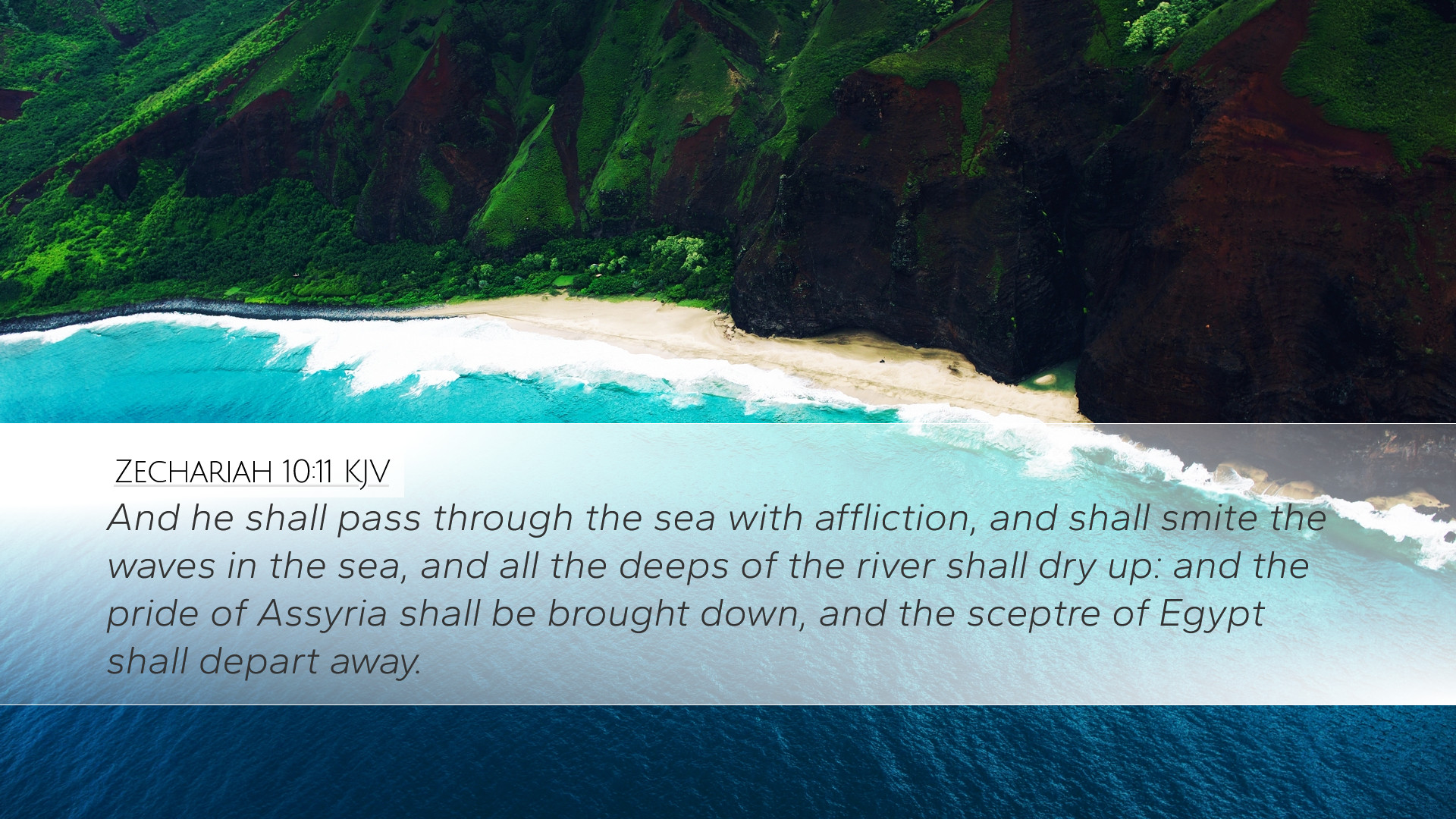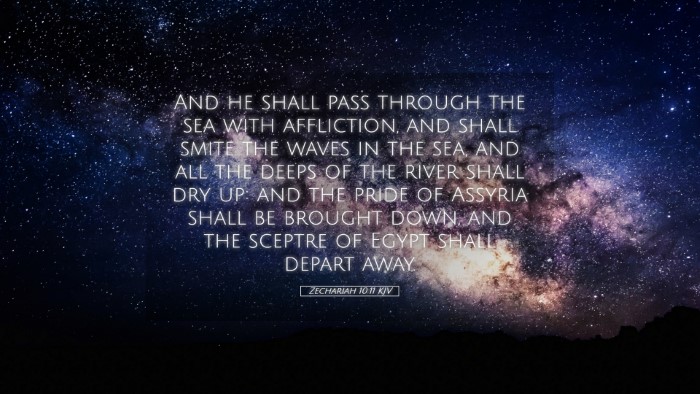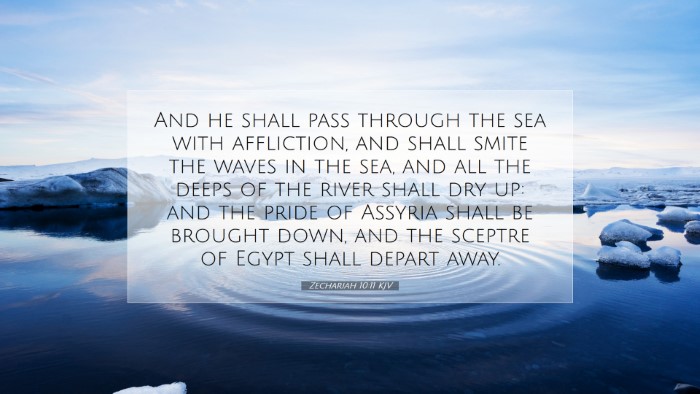Old Testament
Genesis Exodus Leviticus Numbers Deuteronomy Joshua Judges Ruth 1 Samuel 2 Samuel 1 Kings 2 Kings 1 Chronicles 2 Chronicles Ezra Nehemiah Esther Job Psalms Proverbs Ecclesiastes Song of Solomon Isaiah Jeremiah Lamentations Ezekiel Daniel Hosea Joel Amos Obadiah Jonah Micah Nahum Habakkuk Zephaniah Haggai Zechariah MalachiZechariah 10:11
Zechariah 10:11 KJV
And he shall pass through the sea with affliction, and shall smite the waves in the sea, and all the deeps of the river shall dry up: and the pride of Assyria shall be brought down, and the sceptre of Egypt shall depart away.
Zechariah 10:11 Bible Commentary
Commentary on Zechariah 10:11
Verse Reference: Zechariah 10:11 (KJV) - "And he shall pass through the sea with affliction, and shall smite the waves in the sea, and all the depths of the river shall dry up: and the pride of Assyria shall be brought down, and the sceptre of Egypt shall depart away."
Introduction
The book of Zechariah includes various prophetic visions and messages that speak to the restoration of Israel and the coming of the Messiah. Zechariah 10:11 is situated within a broader context of hope and deliverance for God’s people. This commentary synthesizes insights from public domain sources, focusing specifically on the implications of this verse for understanding God’s sovereignty and redemptive work.
Contextual Background
Zechariah prophesies during a time when the Jewish people were returning from Babylonian exile. His messages reflect both a call to repentance and a promise of divine restoration. This particular verse illustrates God's power over natural elements and political powers.
Literary Structure
The verse employs vivid imagery and metaphors to depict God's intervention in the world, symbolizing both physical deliverance and spiritual victory. The sea often represents chaos and the unknown, while references to Assyria and Egypt signify the historical foes of Israel.
Exegesis of Zechariah 10:11
Exegesis reveals significant themes regarding divine intervention and judgment.
Divine Passage Through the Sea
Albert Barnes notes that the act of passing through the sea evokes the Exodus narrative, where God miraculously delivered His people from Egyptian bondage. The mention of "affliction" indicates that despite the deliverance, trials may accompany God’s saving actions. This serves as a reminder that trials can precede triumph.
The Smite of the Waves
Matthew Henry interprets the smiting of the waves as a demonstration of God’s authority over chaos. The waves, which often symbolize opposition and turmoil, are subdued by God’s mighty hand, signifying His power to calm the storms of life. This metaphor encourages believers that God can bring peace amid adversity.
Drying Up of Rivers
Adam Clarke highlights that the drying of the depths of the river represents the removal of obstacles that hinder progress. In ancient Israel, rivers were crucial for agriculture and livelihood. Thus, their drying signifies complete deliverance; when God acts, He clears the path for His people, enabling them to thrive where they once faced despair.
Theological Implications
The verse unveils significant theological themes, including God’s sovereignty, redemption, and the promise of restoration.
God’s Sovereignty Over Nations
Both Assyria and Egypt symbolize nations that exercised dominion over Israel. The pride of Assyria and the scepter of Egypt represent political power that stands in opposition to God’s plans. Matthew Henry elucidates that God will humble those who oppose Him, ensuring that His people will experience divine favor over earthly authorities.
Restorative Nature of God’s Actions
The passage underscores God's commitment to restoring His people, not just physically, but spiritually. The deliverance from oppression leads to a renewed relationship with God. Albert Barnes stresses that understanding God's covenant faithfulness is key to grasping the full depth of this promise.
Application for Believers
For pastors, students, theologians, and scholars, Zechariah 10:11 serves as a reminder of the assurance of God’s intervention in our lives.
- Trust in God’s Deliverance: Believers are encouraged to place their trust in God’s ability to deliver from both personal and communal afflictions.
- Embrace Trials as Part of Growth: The acknowledgment of "affliction" teaches that trials are often necessary for spiritual growth and maturity.
- Understand God’s Power Over Circumstances: The imagery of smiting waves and drying rivers encourages believers to seek God’s power in their lives, recognizing that he can change any situation.
- Recognize the Temporary Nature of Earthly Powers: Just as the pride of Assyria is humbled, contemporary believers are reminded that earthly powers are transient; God’s kingdom ultimately prevails.
Conclusion
Zechariah 10:11 paints a powerful picture of God's intervention and sovereignty over history and creation. This verse serves both as a prophetic promise for the Jewish people and as a timeless message of hope for believers today. The insights from public domain commentaries reveal deep theological truths relevant to understanding God's nature and His plans for His people. As such, it challenges us to live in faith, trusting that God can move mountains and part seas in our lives.


